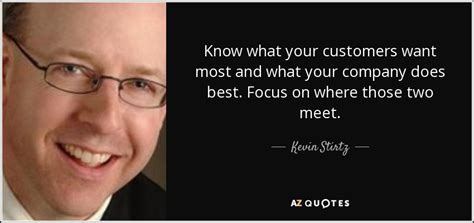A Quote by Alexander McQueen
There has to be a balance between your mental satisfaction and the financial needs of your company. (But) I always remember that it's the fantasy, the artistic side, that makes customers want to buy the straightforward black pants.
Related Quotes
Always treat your employees exactly as you want them to treat your best customers. You can buy a person's hand, but you can't buy his heart; his heart is where his enthusiasm is. You can buy his back, but you can't buy his brain. That's where his creativity is. Treat employees as volunteers just as you treat customers as volunteers, because that's what they are. They volunteer the best parts - their hearts and minds.
Convincing isn't really possible in an age of customer control. Customers hold most of the cards today. They have good visibility into their choices, and they can easily share information with each other. Not only that, they don't like to be sold. But they do like to buy. Your job shouldn't be to convince customers to buy, but to help them buy what they want.
In the context of our world, sizes 8 and 10 are teeny, but not for Hollywood. I had to ask myself, 'Do I want to be somebody who worries about what I'm eating? Or do I want to find a balance where I can be healthy and not consumed by that and maybe have to buy some larger pants?' I bought new pants.
The secret of successful retailing is to give your customers what they want. And really, if you think about it from the point of view of the customer, you want everything: a wide assortment of good quality merchandise; the lowest possible prices; guaranteed satisfaction with what you buy; friendly, knowledgeable service; convenient hours; free parking; a pleasant shopping experience.
My position is that the rate should align with the level of economic development. Because it is always about a balance, a balance of interests, and it should reflect this balance. A balance between those who sell something across the border and those who benefit from a low rate, as well as a balance between the interests of those who buy, who need the rate to be higher. A balance between national producers, for example, agricultural producers who are interested in it.







































